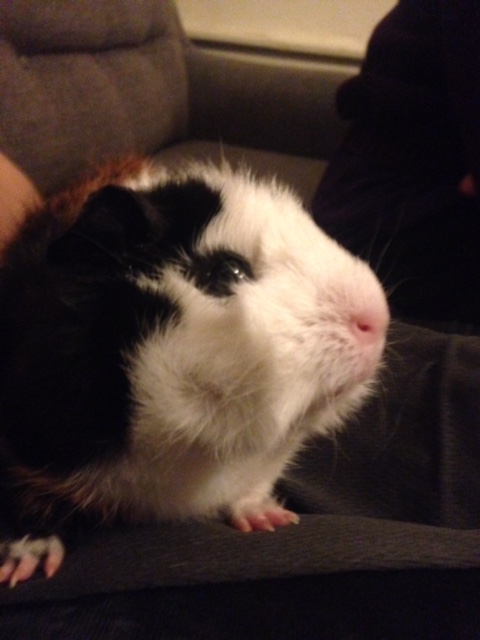My son’s guinea pig Smoky fell ill yesterday. My son was out playing soccer with his friends in
the park when my daughter, who’s home from college, called out from the next
room: “Dad, come here and look at Smoky, she’s moving really slowly.”
As soon
as I saw her I knew it was serious. Smoky had been a bit quieter than usual in the last few days, and the kids had remarked that she seemed a bit lighter but
they weren’t sure if it was their imagination; she was always a light, fluffy
little rodent and never terribly reactive—one of those guinea pigs who just
sort of stares at you with doll eyes and makes birdlike noises while wrinkling her
nose. She still ate and drank prodigiously and chattered whenever my son came in
the room, so I didn’t think anything was wrong.
But something was wrong.
She didn’t react to my touching her paws or her teeth, and she barely squirmed
at all when I reached my hand under her belly and raised her up a bit. She
looked exhausted. I’d never seen her that way before. She’d seemed a bit slow or depressed in the past week, but just a day earlier she’d
been chattering and eating hay.
We
wrapped her up in a brown towel and walked her to the veterinary clinic about
15 minutes away.
On the way I experienced mild flashbacks to the day of my
wife’s death. I heard she’d collapsed in Brooklyn when I was working in a
newsroom in Newark, and the approximately two hours it took me to get to Long
Island College Hospital, complete with train delays, was the longest two hours
of my life. Walking Smoky to the vet, cradling her like a baby, I thought about
how difficult the past six weeks had been. We moved into a new apartment in
late April—a difficult move, and I say that as a person who’s moved nine times
in 21 years—and I think the stress might have pushed Smoky’s cage-mate, Scully—an
eight-year old, plump, fairly sluggish female guinea pig—over the edge. My friend found her dead one afternoon a couple of days after we moved in. I
told my son we needed to get another guinea pig because (or so I’ve read) they
do better with companions, but he was torn; he loved Smoky but was slightly overwhelmed
by all the other pets in the house (a large tropical fish tank and two kittens; he
feeds them all every day, solo or with me or his sister) and he thought it would be
best if we gave Smoky to somebody who keeps guinea pigs instead of committing to
raise a couple for who knew how many more years. I agreed, but cautioned him, his sister and myself to
take extra good care of Smoky during this interim period while we figured out
our next move.
Fast-walking down 3rd Avenue in Brooklyn with the
pig in the crook of my arms, I started blaming myself for not being on top of
the situation. I made a mental list of everything that we should have done to
prevent her from getting sick. I didn’t know what the problem was at that
moment, but I felt sure that it was our fault collectively, and my fault specifically,
as a parent and the head of the household, for not paying closer attention to
all of our pets, Smoky in particular. Did we not feed her enough? Did we allow
the water bottle in her cage to run dry and stay that way? Did we fail to show
her enough love? Was she sick from loneliness, missing her old friend Scully?
Then I realized that even though I’ve lost a lot of loved
ones in my life, humans and animals, I’ve never actually witnessed the moment
of death. I wondered if this would be the time. Would Smoky die in my arms as I
was walking her to the vet?
I stroked her head and throat as we walked and started
talking to her. “Don’t give up, Smoky,” I said. “We’re almost there.” She
squirmed a little bit. I took that as a positive sign. But I didn’t know for
sure. I hoped that she was staring up at the trees and the sunlight and
becoming interested in the world again after spending the last few weeks in one
or two rooms of a Brooklyn apartment. I thought maybe this would rejuvenate
her. My next thought was that if Smoky made it through this, we were going to
have a family meeting to assess everything we’d done wrong that might have
contributed to this.
I wasn’t sure what that was, though, because from everything
I could tell, my son had been diligent about taking care of Smoky. He never
missed a feeding, rarely let the water bottle go unfilled for more than a few
hours (less of a problem that it had been when there were two guinea pigs) and
played with her. He liked to bring her into my bedroom and sort of sneak up
behind me and position Smoky right behind my ear so that I’d see her out of the
corner of one eye; then my son would say, “Writing pig. She wants to know what
you’re writing about.”
The vet said Smoky’s vital signs were weak and that she felt
underweight. Her heart rate was slow and her body temperature was below normal.
They took her into a back room and gave her intravenous fluids and vitamins, wrapped
her in the towel and tried to raise her body temperature with a hair dryer.
The vet said Smoky had only a small chance of pulling
through. They didn’t know what, exactly, was causing her decline, but it was
clear from her condition that she was on the edge.
We went through the checklist. Was she eating and drinking
as usual? Yes. Was she making noise? Yes. Had we noticed any unusual bathroom
habits or vomiting? No. Was she still “talking” to us? Yes. “Just last night
she woke me with her squeaking,” I said.
They said that the best strategy would be to take her to an
animal hospital where she could stay overnight for observation, because the
kind of care she required was something that we couldn’t realistically do at home.
I told my daughter to go the soccer field and fetch her brother, then meet me
at the pet hospital. I called a taxi service and piled into it with Smoky. We
drove to the hospital. My daughter texted me to say that she and my son arrived
there pretty quickly and were sitting in the lobby waiting for us. Rush hour
traffic was terrible. What was supposed to be a twenty minute trip stretched
into forty. I kept stroking Smoky’s fur and trying to elicit some reaction from
her. “It doesn’t look good,” I texted my daughter. “There’s still hope, but it doesn’t
look good.”
I shut the phone off to save what little battery was left
and spent the last twenty minutes of the ride talking to Smoky, petting her,
and feeling like a complete and utter failure as a human companion. I did this,
I thought. This is my fault. The list of things we should have done differently
got longer. Did we not clean the cage often enough? I don’t think so; the
litter got changed once a week, usually. The most recent cleaning had been a
few days ago. I began to wonder if my son hadn’t been honest with me about
feeding Smoky, playing with her and changing her water, but just then my daughter
texted me to say she’d asked my son the same questions while waiting in the pet
hospital lobby, and he’d insisted that he’d done his job. I believed him. My
son doesn’t lie about things like this, and he’s one of the only people I’ve
ever met who always keeps his promises, and he adored that pig. So it had to be
something else. The trauma of the move? The trauma of losing her cage-mate? Did
she get so lonely that she fell ill? Was it possible that our guinea pig might
turn out to have died of loneliness?
The animal hospital rushed Smoky into the emergency room
immediately and began treating her while I filled out forms. The doctor invited
us to come back into an exam room. She asked us all the same questions the vet had asked us, plus more specific questions about her diet (hay, vegetable pellets, bits of carrot or celery or lettuce) and how much she ate and drank.
She told us the hard truth: Smoky was not
well, and that while it might be possible to nurse her back to something like
health, there was an excellent chance that she could quickly decline again, so
we were probably looking at a situation where it would be better to just put
her to sleep than subject her to further pain for no good reason.
Then she left for a while, and after she came back, she told us that the tissue surrounding the vital organs in Smoky’s belly was filled with “blockages.”
“Blockages?” I said. “Does that mean she has parasites?”
“No,” she said. “We’re pretty sure it’s cancer.”
I felt a bit dizzy just then. I leaned against the wall to
steady myself. My son was in tears. My daughter was in tears, too.
I said, “Cancer? Jesus Christ. How did she get cancer?”
The doctor said, “It’s probably impossible to know that.”
I said, “Was it environmental?”
She said, “Some cancers are environmental, but only a very
small percentage, usually caused by toxins in the environment.”
“I meant could there have been something in her immediate
environment, something we did or didn’t do, that gave her cancer?” I knew
animals could get cancer—about eight years ago, our cat had died of it at age
16—but for some reason it just didn’t occur to me that guinea pigs could also
get cancer.
Now I was crying. I really hoped there’d be a happy ending
to this particular afternoon. A miraculous save, after which my family would
rally and repair whatever mistakes had led to our pet’s illness.
But it turned out to be nothing like that.
“Animals get cancer just like people do,” the doctor told
me. “Sometimes you just don’t know why. It just happens. We usually don’t know
why some animals get cancer and some don’t. There’s no rhyme or reason.”
I expressed shock that Smoky could have declined to this
point so quickly, and she told me that some cancers hide in plain sight. “She
could have had it for a long time, but it didn’t become active until recently,
or maybe she was dealing with it for months but for whatever reason there were
no obvious signs. There’s a lot about cancer that we don’t understand.”
I thought about my stepmother, who was diagnosed with cancer
in November of 2008 and died three months later. The cancer went from
potentially treatable to ravaging within the span of months.
I also thought about my grandmother, who died of bone cancer
when I was in high school – how thin she got near the end, how quickly it
happened.
“You understand what’s at stake here?” I said to the kids. “They
could take heroic measures to try to save her, but she’ll probably get sick
again and they’ll have to save her again…”
“I understand,” my son said.
“I understand,” my daughter said.
They gave her the injection, then after a few minutes a
veterinary assistant brought her into the room so that we could say goodbye to
her. She placed Smoky on the aluminum tabletop, still wrapped in that brown
towel. There were bits of hay in the terrycloth. Two thin plastic tubes extended
from her body where they’d inserted the tubes to euthanize her.
I often read accounts of death where the dead are described
as looking oddly peaceful. I’ve seen a few dead people now, and none of them
looked peaceful. They looked exhausted. Worn out. That’s how Smoky looked. Like
she didn’t have any fight left in her.
They took Smoky away and brought in some cremation forms. The kids
sat there while I filled them out. Nobody spoke for a while. My son and
daughter both seemed to regain their equilibrium, though they were
red-eyed and punchy.
As I was signing the cremation papers, my son was studying the cork board on the wall behind me. He was grinning.
“What?”
I said.
He pointed to a close-up photograph of a fat little bulldog with a gimlet-eyed, Al Capone grin.
There were all sorts of pictures on the corkboard, all of
happy pets. We pointed out some of the better ones and goofed on them. There
was a golden retriever who looked a bit like Christopher Walken, a rat-sized poodle with gigantic eyes, and a cat photographed in the act of rising up on its hind legs
to peek through a window at a fish tank. Something about the cat’s
positioning made it seem as if it was no big deal to walk around on two legs,
and its right paw was cocked at such a jaunty angle that it looked as if it
should be dangling a set of keys.
“I like the bulldog,” my son said.
We had dinner in the neighborhood and talked about Smoky and
other loved ones that we missed. At one
point I nearly said something about how this day was a reminder that life is
precious and you never know when your number is up, but I didn’t, because the
kids were sharing a milkshake and making fun of each other and I didn’t want
to ruin the mood, and because they already know all about this stuff. It is not something that has to be explained to them.
Somehow the conversation turned to God and the Bible, and I
said that while I was not a religious person, I did appreciate certain passages
of the Old and New Testaments for the way they put life in perspective. I told
them my favorite book is Corinthians, and that it was their mother’s favorite,
too. We had the pastor read from it at our wedding. A different section was
read at her funeral.
“Which one?” my daughter asked.
“My phone battery is dead, but if you have any left on
yours, see if you can look up Corinthians.”
She did, and I located it: a bit of St. Paul’s Epistles. I told
them that I asked my friend Alan Sepinwall to read this passage at Jen’s memorial because
it was at the center of Jen’s favorite scene from her favorite TV show, David Milch’s “Deadwood”:
the funeral of Will Bill Hickok.
I told them that this passage was about the
body as a metaphor for the family or the community, and how one part needs
every other part, even the seemingly small ones, and how everything is
connected. Milch rewrote the Bible a little bit, perfectionist that he is, but I
couldn’t find his exact wording, so I settled for reading them the first halfway
decent rendition that came up on Google:
“The eye cannot say to the hand, “I don’t need you!” And the
head cannot say to the feet, “I don’t need you!” On the contrary, those parts
of the body that seem to be weaker are indispensable,and the
parts that we think are less honorable we treat with special honor. And the
parts that are unpresentable are treated with special modesty, while our
presentable parts need no special treatment. But God has put the body together,
giving greater honor to the parts that lacked it, so that there should be no
division in the body, but that its parts should have equal concern for each
other. If one part suffers, every part suffers with it; if one part is honored,
every part rejoices with it.”
Then we asked for the check and went home to play with the
cats.












